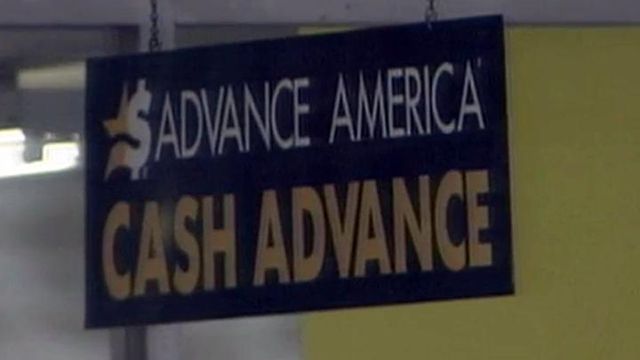Payday lending bill draws criticism
Sen. Jerry Tillman, R-Randolph, said there is a need for small short term loans, but Attorney General Roy Cooper said the return of the industry would be a "bad idea."
Posted — UpdatedLawmakers outlawed payday loans in 2001, and a 2005 court case pushed the last pieces of the industry out of the state.
Tillman said Thursday that there were problems with the old payday system, but he said there's a need for people to get short-term credit based on their income.
"We have people who get in a bind from time to time, good people who have a job," he said. "I've run into people in my district who have the need."
The classic example, he said, was someone who needs money to repair their car but doesn't have a credit card.
Tillman's bill would cap the amount borrowed at $500 and limit the interest rate to 15 percent. That's lower than payday lending bills from prior sessions but still amounts to an annual percentage rate of 300 percent for a loan repaid in two weeks, consumer advocates say.
Tillman's bill has drawn criticism from consumer advocates and Attorney General Roy Cooper, a Democrat, who said the payday industry should not be allowed to gain a foothold in the state.
"Payday lending is like needing a life preserver and being thrown an anvil," Cooper said. "We've seen it in north Carolina – very high interest. People tend to get on a debt treadmill they have a hard time removing themselves from.
"When you unleash this industry on North Carolina consumers, a lot of people are going to be hurting."
After fighting payday lenders for years, he said, he's not surprised they're trying to come back.
"There's a lot of money to be made from people who are struggling with this business," he said.
Consumer advocates also criticized the measure, which is tentatively expected to be heard in committee next week or the week after.
"The way the loans are designed, it's very hard to pay them off. So, not only are you paying an incredible amount to have these loans, you also have a very high expectation or risk that you'll be trapped in these loans for a long time, paying those very high interest rates," said Al Ripley, director of the Consumer and Housing Project at the left-leaning N.C. Justice Center.
“These loans are especially dangerous to seniors,” said Helen Savage of AARP North Carolina. “The high costs of predatory loans carry serious risks for all of us, but especially for older North Carolinians on fixed incomes.”
Tillman acknowledged that there were problems with the old system of payday lending. Borrowers could get in trouble when they couldn't meet the terms of their first loan and took out a second loan to pay it off. That sparked a cycle of debt that many found hard to escape.
"The rollover thing is what killed people in the past," Tillman said, adding that the bill will likely be revised.
For example, he said he hasn't decided whether the Commissioner of Banks or another state agency should oversee the industry.
"If we're called upon to regulate it, we'll do that," said Ray Grace, acting commissioner of banks.
His office played a role in the lawsuit that closed down the industry here in 2005, but he said it wasn't his role to advocate one way or the other.
"It's up to the General Assembly to determine what's best of the people of the state," Grace said.
His office's only concern would be making sure the rules for regulating the industry were clear and that there was sufficient funding to provide oversight.
Payday lenders said legalizing their industry again would help people with poor credit.
"It helps ensure that, during economic hardships, North Carolinians have access to reasonable, properly regulated financial options," Jamie Fulmer, senior vice president of Advance America, said in a statement. "In recent years, consumers' borrowing choices have narrowed, but their need for credit has not diminished."
Ripley said there are plenty of less-predatory options.
"We've done just fine in North Carolina for over 10 years without payday lending," he said. "In fact, I would argue that borrowers are much better off without this product."
Rep. Ruth Samuelson, R-Mecklenburg, said the payday bill was one of several pieces of banking legislation she knows people are interested in running through the House.
A House companion to Tillman's bill has not yet been filed, and Samuelson said there are other non-traditional lending products that businesses might ask to legalize. However, she said, there are other bills dealing with mortgage interest and a cleanup of state banking act regulations that will take priority.
"Those are the structural things we need to do," she said. Asked whether the payday loan bill will get done, she said, "we'll see."
In a news release on the measure, Cooper noted that the bill would not allow for payday loans to be made to military families.
"Congress already banned payday lending to military personnel in 2007 to protect service members from these predatory loans," he said.
Related Topics
Copyright 2024 by Capitol Broadcasting Company. All rights reserved. This material may not be published, broadcast, rewritten or redistributed.





